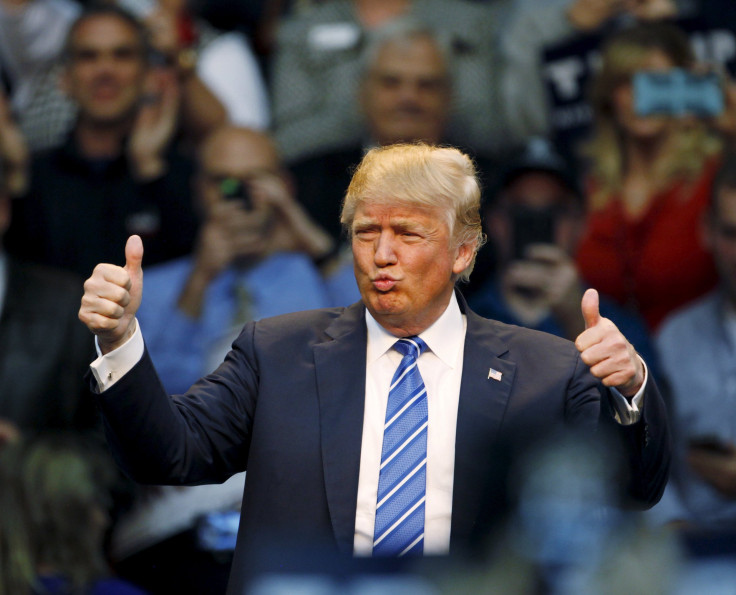Donald Trump Campaign: Billionaire Forming Blue Collar Lane As Candidate

If the rock you’ve been living under isn’t especially sound-proof and hasn’t been muffling Republican U.S. presidential candidate Donald Trump’s near-constant proclamations that he is, indeed, atop the opinion polls, then you’ve heard the bombastic billionaire is leading in the GOP race for the 2016 nomination. He’s gotten to that much-ballyhooed top spot through a form of Trumpian populism that has appealed to, and brought together, blue-collar voters who aren’t especially engaged by social issues but feel the country is in a bad way, the Wall Street Journal reported Friday.
According to the latest CNN/ORC poll, Trump has pulled even further ahead, leading his closest competitor by 20 percentage points in the national race for the Republican nod. GOP presidential-nomination contests have typically turned into two-horse races, pitting an establishment candidate against a social-conservative candidate, but Trump appears to have created a third category, drawing largely on voters without college degrees who aren’t particularly engaged by issues such as abortion rights or same-sex marriage, the Journal said. The result could be a three-person contest among an establishment choice, a social-conservative pick and Trump. Polls have shown Trump pulling support from different segments of the Republican base, because of certain voters’ beliefs that he is a strong leader who can right the ship of state.
Trump’s attracted these voters less through policy positions or his resume, and more through force of personality and the promise of strong action.
“He’s cutting across” many GOP segments, Republican strategist David Winston told the Journal.“It’s opened up an avenue for people who want to hear a candidate say, ‘I want to do this, and I’ll do it no matter what.’”
The most recent Quinnipiac University Poll results released Wednesday showed Trump with 27 percent support, 10 percentage points ahead of U.S. Sen. Marco Rubio of Florida. Trump held a large lead among voters who said being a strong leader was the most important attribute for a nominee. However, his lead among voters who cared about values was just a few percentage points. And in a sign that Trump’s brashness is both his biggest asset and his biggest liability, 26 percent of conservative voters said they definitely would not vote for him. The candidate’s core supporters haven’t faded, however.
“It doesn’t seem to matter what he says or who he offends, whether the facts are contested or the ‘political correctness’ is challenged: Donald Trump seems to be wearing Kevlar,” said Tim Malloy, assistant director of the Quinnipiac University Poll.
Polls by the Wall Street Journal and NBC News also have found Trump draws about one-quarter of the support of Republican primary voters without any college education, while his support ranges between 13 and 15 percent among voters with college degrees. He was the only candidate with such a gap, the Journal reported. In the CNN/ORC poll results released Friday, that spread in support was even wider. Trump has been leading in the polls largely based on the support of blue-collar, less-religious workers who earn comparatively little money, and that base could prove to be his biggest asset. As NPR noted, Trump has developed a populist appeal aimed at voters who are fed up with a host of issues, ranging from economic problems to immigration concerns to typical politicians.
Experts told the Journal they didn’t see an easy comparison to equate with the Trump phenomenon. One name that has been floated, with varying degrees of support for the comparison, is Ross Perot, an outsider who ran as an independent in the 1992 general election and won 19 percent of the vote. That presidential race saw the Democratic challenger Bill Clinton easily top the GOP incumbent George H.W. Bush.
This precedent has led some to believe that Trump could mount a third-party campaign, even though the candidate has taken a pledge against doing it. Meanwhile, at least a portion of Trump’s support has come from conservatives and Democrats who plan to vote in Republican primaries, the Journal noted. Trump has said he’s looking to engage the so-called silent majority, a phrase first employed by Richard Nixon in 1969, when his own brand of populism won the Oval Office. Should Trump lose the nominating race, he could look to draw on that silent majority for an independent run. At least for now, Trump seems to be successfully going after a bloc of voters who lack formal education but believe in his version of America.
But the Trumpian methods that have drawn blue-collar support and left him atop the polls may not be replicable. Matt Strawn, the former chairman of the Iowa Republican Party, told the Wall Street Journal, “At present, this appears to be a Trump-specific phenomenon, rather than a new electoral portal for a nonbillionaire, nonreality-TV star Republican to follow.”
© Copyright IBTimes 2024. All rights reserved.






















